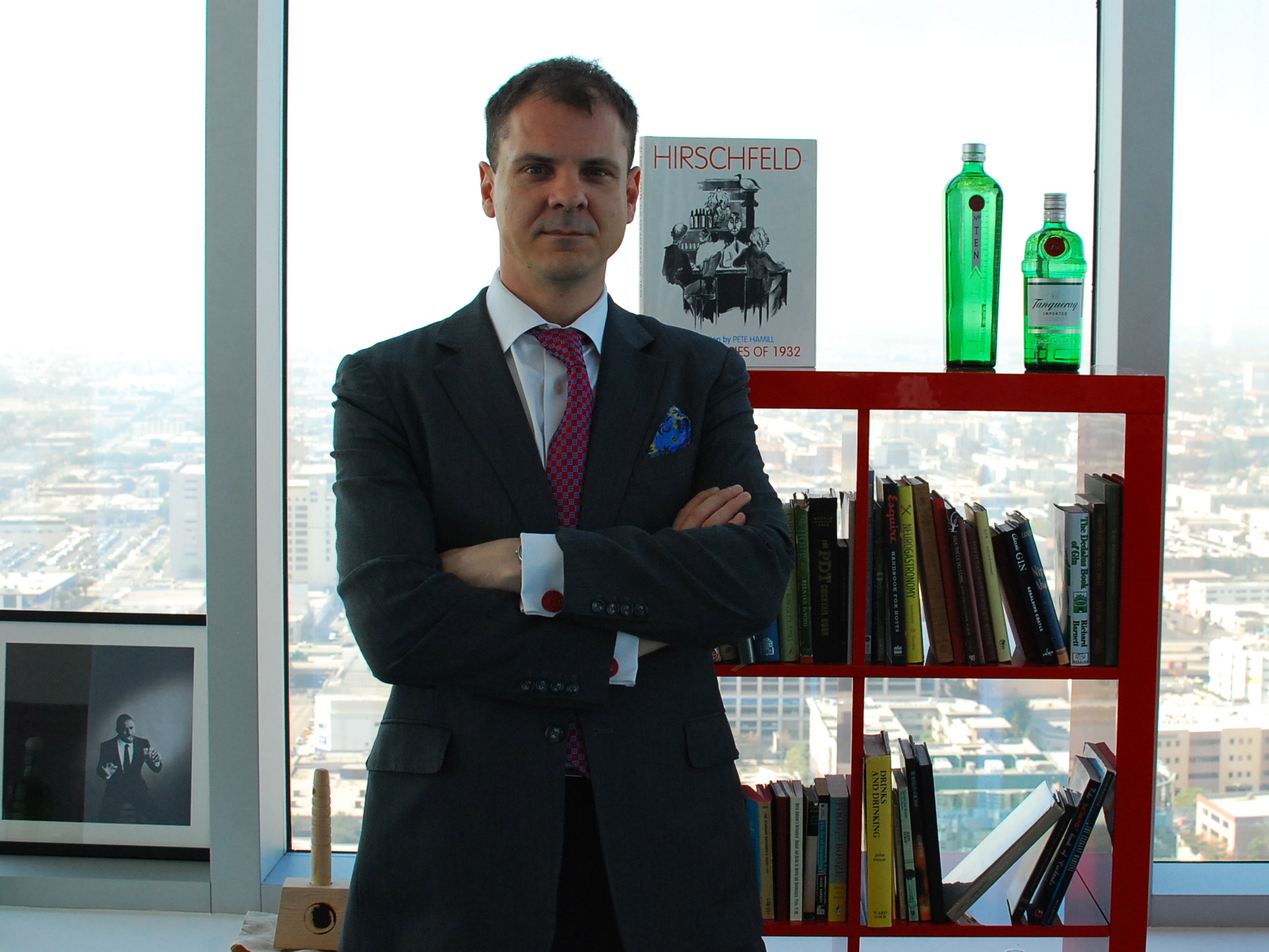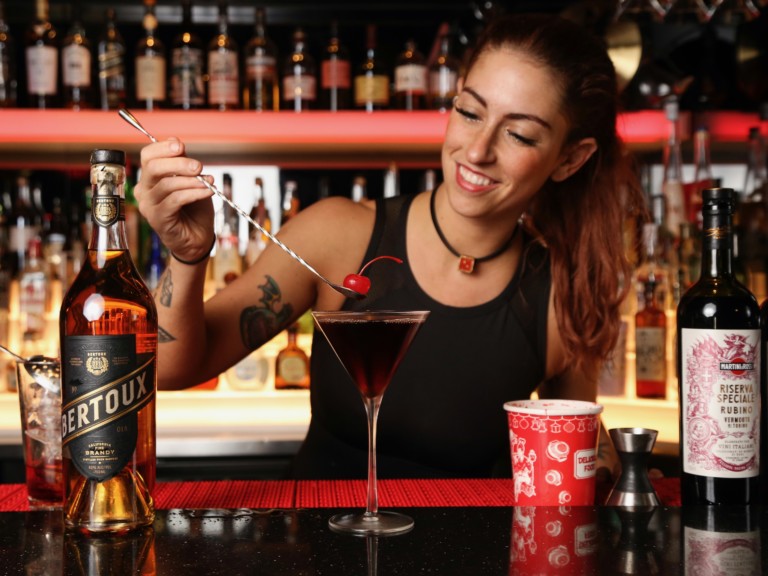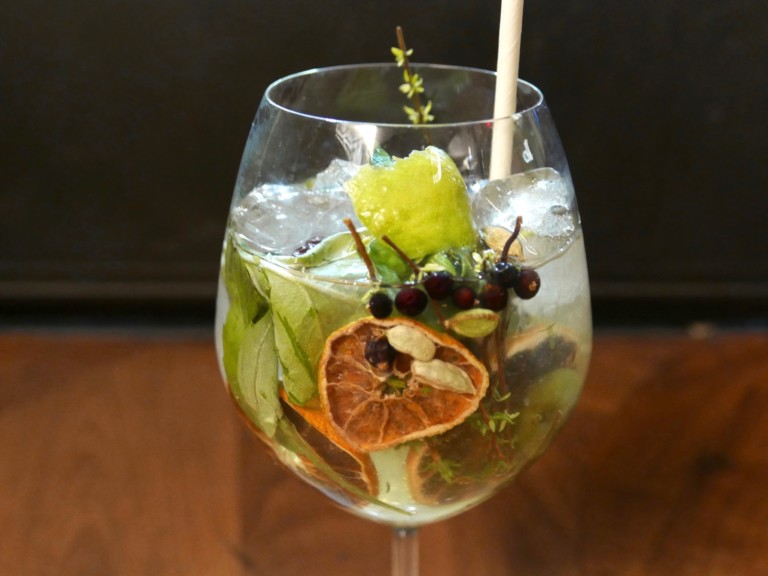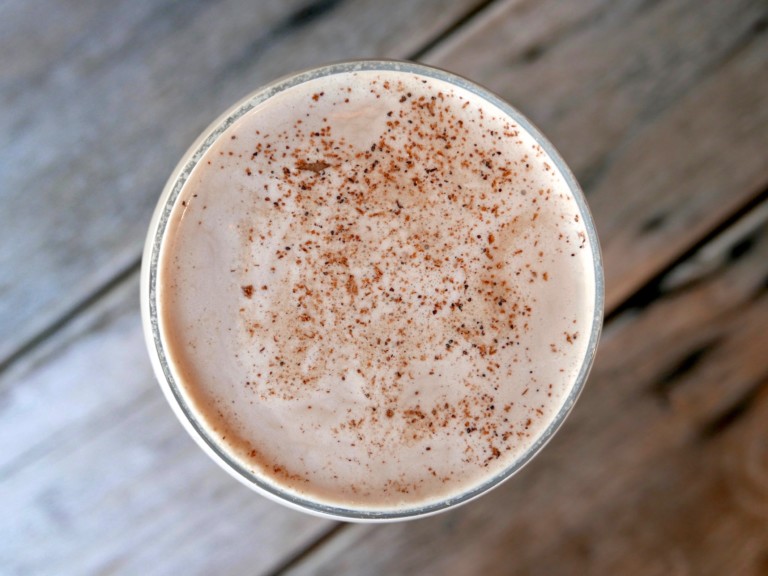Angus Winchester, Global Brand Ambassador for Tanqueray and recipient of Best International Brand Ambassador at the Tales of the Cocktail 2012 Spirited Awards, was recently in Los Angeles to teach a series of gin clinics at the top of a downtown office tower. He’s spent the past 24 years working with cocktails and spirits, has become adept at spotting spirited trends while traveling the globe, and generally has deft industry insights.
Do you miss anything about being behind one bar on a regular basis?
I do. The bar environment is the one place on the planet that I feel absolutely at ease. That is my world back there. It’s not like I’ve seen everything, but I’ve seen so much that I just feel more confident. On that side of the bar, I’m Vic Champagne, international bartender, and on this side of the bar, I’m Angus Winchester. I’m a civilian, but I miss being able to make people’s drinks, being able to build up regulars. That’s always great, when you get that feedback of a guest coming in and saying, “Hey, it’s great to see you again. What are you drinking tonight?” And they say, “What are you making? Because everything you introduce me to is great.” That makes the job worthwhile. I feel like I’m doing more good by working as a traveling educator and brand ambassador. I had to weight that one up. It’s difficult to work in any one place if you’re not in any one place for long.
What convinced you to take on the task of becoming the global brand ambassador for Tanqueray?
A bunch of things. Firstly, I’d actually set up my first company on the back of the work I was doing for Tanqueray 13, 14, 15 years ago. So I’ve always had an affinity for the brand. Secondly, I truly believe Tanqueray London dry gin, classic Tanqueray, is an absolute benchmark. The style and fashion is considered by many experts to be a benchmark. And I thought representing that would be great. Plus I knew the brand trusted me and knew they wouldn’t just get me to stand up and be a talking head, saying, “This is the best gin in the world.” There isn’t a best gin in the world. They would allow me to bring my own spin, not just on it, but also in the way we deliver any messaging.
I also realized I’ve also gotten really good at spotting trends, so 15 years ago, talking about forgotten classic cocktails, which now are into the mainstream, the Aviation, the Martinez and the Last Word. Spotting Japanese bartending about 12 years ago. I videoed a lot of Japanese bartender while I was over there before it became hip. Five years ago, when I was asked to be an ambassdor, that I saw gin was coming back in a large way, and that having a Tanqueray soapbox to stand on would be generally beneficial.
At what point did you know that you would work with cocktails and spirits for a living?
It was weird. I got into bartending at a rather crappy nightclub in Oxford to try and earn some money for what we call a gap year, a year between high school and college – you would call it – or school and university, you take a year and travel, broaden your horizon and get out of academia to re-set yourself. During the day, I was working in a shop, and someone said, “To earn money, you should work in the evenings as well. A friend of mine was working in a nasty nightclub. I worked there, came back to university, of course ran up debts as one does as a student, and was lucky enough to get a job in a Mexican restaurant. I realized it was a very easy job to do badly, and a very difficult job to do well. This was a job where you were basically being paid to flirt with girls, to make people feel good, to sell good booze as opposed to lots of booze. On the whole, I stumbled into it but realized that there were so many different diverse skills, it was a challenge to be really good at it.
What do you remember about that very first night behind the bar?
I still remember that very first drink I made, which was really weird, gin and orange. I think I’ve probably only served half a dozen gin and oranges in my life, but this one, I literally had no idea. I was taken behind the bar, “Here you go.” I used gin and we had optics – the things on the backs of pubs in England – gin, orange cordial – which is like a sweetened orange juice, like Rose’s lime juice, but the orange version – no ice, no water, and gave it to the girl, and the weird thing is, she’s the sister of a friend of mine. And occasionally I see her, and it’s like, “Acacia says you’re this hotshot bartender. I remember that first drink you gave me, and it was horrible.”
It was nerve wracking, the same way now when I do a guest bartending shift. You walk behind, and you don’t know where anything is. You don’t know their recipes or systems. It’s a bit nerve wracking, but you get used to it.
What are the keys to great gin and tonics, or great gin martinis?
Firstly, obviously, a gin that actually tastes of juniper. It’s weird. Gin, by law, juniper must be the predominant taste, but for some reason now, because of the craft and artisanal movement, we’re creating gins that don’t taste of juniper, because they’re trying to do something different. But juniper has this incredible chameleonic like quality that makes it work with so many ingredients. The worst thing about gin and tonics in this country is tonic from a gun, it’s no brand, generally dispensed badly because of the machinery. I will take any luxury boutique tonic water, as long as it’s in a small bottle. I’ll take Schweppes or Canada Dry over something in a gun, but realizing we don’t want too much liquor – it is an inverted cocktail and it has proportions – so three parts tonic water, one part gin – I like a squeeze of lime and a dash of Peychaud’s bitters with mine, because I’m quirky.
And a martini, there are four questions a bartender should ask you before preparing a martini, and if they don’t, don’t trust them. Because there isn’t a recipe for a martini. It’s a ritual. It’s a conversation. It’s a ceremony. They should ask you what gin you want. They should ask you the James Bond question, “Shaken or stirred?” But not we have rested and rolled and thrown and all sorts of other techniques. Thirdly, how dry do you want it? A martini is gin and dry vermouth. A vodka martini is something different. Gin and dry vermouth is fantastic. The proportions can change, from wetter – more vermouth – to bone dry with hardly any. Finally, the last question is, “Where’s Charles Dickens?” You look at me strangely. Oliver Twist? Because of course it can be done with olives or numerous twists. And if you ask me those questions, I know as a bartender that you care and that you care about me, as well as being knowledgeable. As a guest, if you ask those questions, or if you say, “Can I get a Tanqueray martini, shaken, fairly wet, with a lemon twist, you are now a discerning clientele. You are a customer I want to spend time with, as opposed to a customer who’s just drinking to get drunk.
Was there anybody who mentored you along your path?
I was very lucky. I look at my first three experiences in bartending as being significant. The first one in the U.K. was working with somebody called Simon Young, who was an ex bartender from one of the great – not many people talk about them now – but there were three or four great bars in London. Not the hotel bars, but places like Peppermint Park, and Coconut Grove, where some of the greatest bartenders did time or were taught by bartenders who did time. There, he taught me that alcohol was not just about getting drunk. Alcohol was somebody’s life’s work. They were very proud of making this. In those days, they only brought 1000 bottles of Maker’s Mark into the U.K. every year. You didn’t just sell this. You almost awarded it to people. Not in a snobby way, but you wouldn’t sell it to somebody who wouldn’t appreciate it. That taught me to love alcohol for the creation, the sommelier side of it, the flavors, the taste, the rarity.
Then I moved to London, and down in London it was about cranking about high quality drinks at top speed. There, whether it was about climbing socks so my knees didn’t go. I always have a waiter’s friend tucked on me all the time.
Then, finally, I moved to New York. New York wasn’t about the quality of the drinks, it wasn’t about how fast, it was really about how you made me feel about the drink, or more importantly, how you made me feel. That idea of on one hand, loving the alcohol, understanding the alcohol, and the second, being able to make it at top speed. Be fast or die. The third one, of hosting, hospitality, dealing with people. In New York they did want you to know their name and remember it when you came into the bar, rather than making them some fancypants cocktail.
Is there anybody in particular in London or New York who stood out in imparting those qualities?
Dick Bradsell in the U.K. was very much considered the godfather of the U.K. scene. Incredible with flavors, but at the same time had this sort of heir about him. He was a great host.
Dale DeGroff, I was lucky enough to meet him when he was still at the Rainbow Room and he inspired me by showing me his library, showed me how many books there are to read, and find knowledge, but he also had this single-minded focus about getting bartenders to use fresh juices. He didn’t want to change the world, but if you could just change sour mix to lemon juice and simple syrup, lime juice and sugar syrup, he would be a happy boy.
But I meet people that are inspirational all the time. I was lucky enough to finally meet a gentleman named Paul Harrington. Paul Harrington was the last person on my original bucket list of bartenders I wanted to meet or serve, or get served by, before I or they died. He wrote a website in the mid ’90s called Hotwired Cocktails and wrote an incredible book that showed me that drinks weren’t just about ingredients. They were about the stories. People created them and you could bring them to life, slightly. I was lucky enough to meet him, and there are new people on the bucket list, but on the whole, I’m lucky enough that I can count the Top 50 bartenders in the world – in terms of trend setters – as my friends, and not just because I’ve lent them money and haven’t asked for it back. Whether it’s Jeffrey Morgenthaler over on the West Coast. Whether it’s David Wondrich on the East Coast, people in Australia or Japan, I’m a lucky guy.
Is there anywhere you haven’t traveled to that you’d like to travel to?
I haven’t done any work in Africa, and I don’t think much of Africa would necessarily be able to appreciate or afford the classic dry martini, but I’d like to do some work in South Africa. I haven’t been to Beirut. I hear Beirut’s a great party town. They’re never sure whether they’ll live or die that day in civil war, so they live every day, or every night, as thought it will be their last. I think that’s an important attitude to have in life in general. Other than that, I’ve done most of Asia, but I’ve done some Latin America and South America, but not quite as much. Yeah, there are always more places I’d like to go.
If you could spend the night behind the bar, anywhere, for a guest shift, where would that be?









Leave a Comment